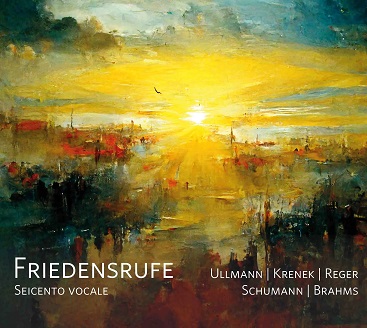Die Menschheit lernt definitiv nichts dazu. Seicento mag auf seinem Debüt-Album sehr wohl Texte aus dem 17. Jahrhundert verwenden, Texte, die an den Dreissigjährigen Krieg erinnern – ihre Aktualität ist im Jahr 2024 dringlicher denn je.
In teils erschütternden Worten schreiben die jeweiligen Autoren von unermesslichem Leid, von sinnlosem Tod und Zerstörung – Worte, die auch heute noch aufrütteln. Und das tut Seicento in seinen Interpretationen ebenfalls. Ohne den mahnenden Zeigefinger auszustrecken, lässt das Ensemble aufhorchen, wohin der Weg des Krieges letztendlich führt – in den Abgrund.
Stimmlich perfekt gerüstet, verleiht Seicento den Partituren von Ullmann, Krenek, Reger, Brahms und Schumann Intensität und Ausdruckskraft.
Besonders in den Werken des frühen 20. Jahrhunderts überzeugen die Sänger und Sängerinnen durch ihre expressive Vielfalt, ihre rhetorische Gewandtheit sowie den klaren sprachlichen Duktus. Ob quasi cluster-artige Klangüberlagerungen oder regelrechter Sprechgesang, das Gesungene und Gesprochene verliert nie an Ausdruckskraft, an Emotionalität und Tiefe.
Dies gilt natürlich auch für den rein romantischen Teil – für Schumann und Brahms. Wort und Musik haben per se genug Ausstrahlung. Seicento lässt beides frei atmen, überfrachtet und überbetont nichts.
Besonders reizvoll ist die Kombination von Victor Ullmanns Melodram Die Weise von Liebe und Tod des Cornets Christoph Rilke und Chorsätzen von Johannes Brahms und Robert Schumann. Hier werden inhaltlich und musikalisch ganz natürliche Brücken geschlagen. Das romantische Repertoire entzieht Ullmanns Werk – entstanden im KZ Theresienstadt – nie die Härte und Wucht von Text und Musik. Schnitter Tod ist allgegenwärtig.
The album may feature 17th century lyrics, lyrics that recall the Thirty Years War – lyrics that are more relevant than ever in 2024.
In sometimes harrowing words, the respective authors write of immeasurable suffering, senseless death and destruction – words that still stir today. And Seicento’s interpretations do the same. Without wagging a warning finger, the ensemble makes us sit up and take notice of where the path of war ultimately leads – into the abyss.
Vocally perfect, Seicento brings intensity and expressiveness to the scores of Ullmann, Krenek, Reger, Brahms and Schumann.
Especially in the works of the early 20th century, the singers impress with their expressive variety, rhetorical dexterity and clear linguistic style. Whether quasi-clusters of sound or pure speech song, what is sung and spoken never loses its expressiveness, emotionality and depth.
Of course, this also applies to the purely romantic part – to Schumann and Brahms. Words and music have enough charisma in themselves. Seicento allows both to breathe freely, never overloading or overemphasizing anything.
The combination of Victor Ullmann’s melodrama Die Weise von Liebe und Tod by Cornet Christoph Rilke and choral works by Johannes Brahms and Robert Schumann is particularly appealing. In terms of content and music, bridges are built quite naturally. The romantic repertoire never robs Ullmann’s work – written in the Theresienstadt concentration camp – of the harshness and power of the text and music. Death is omnipresent.



















